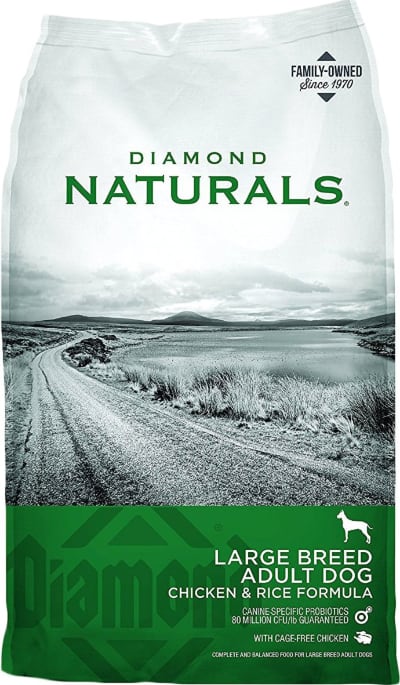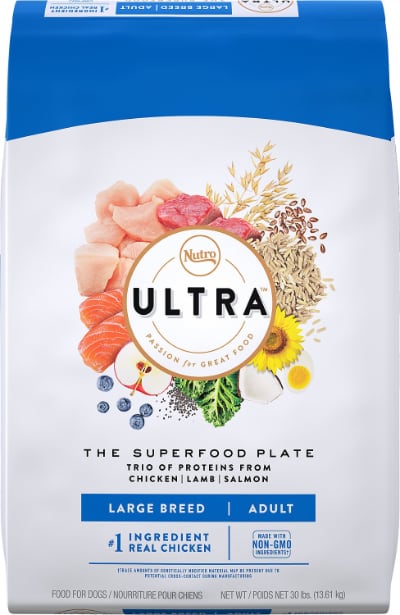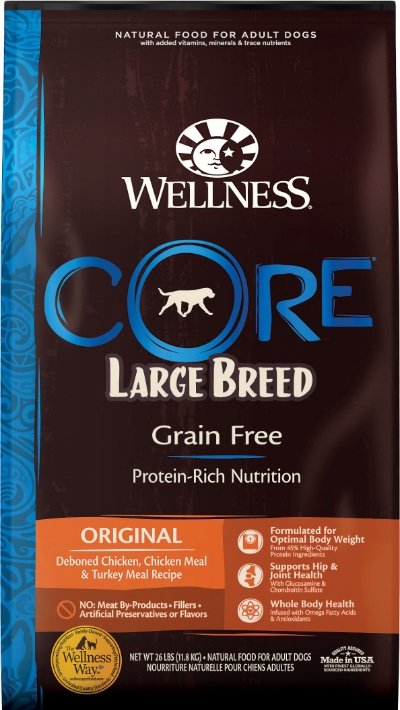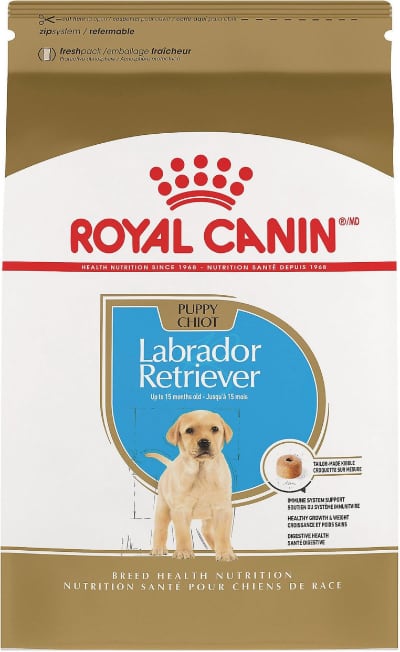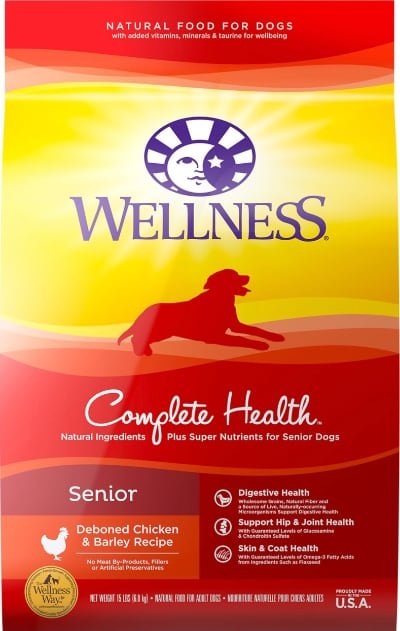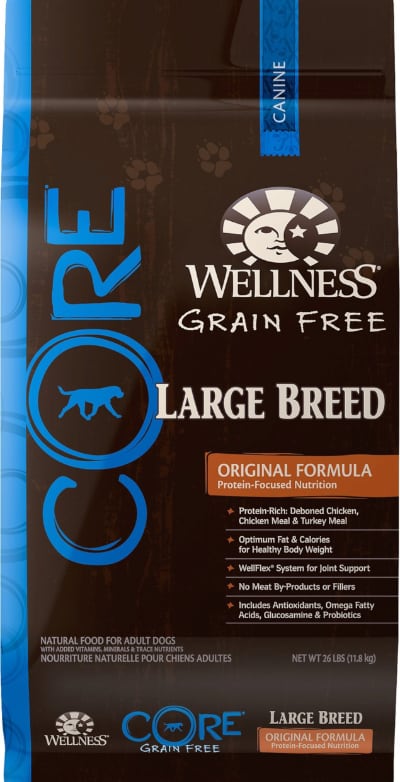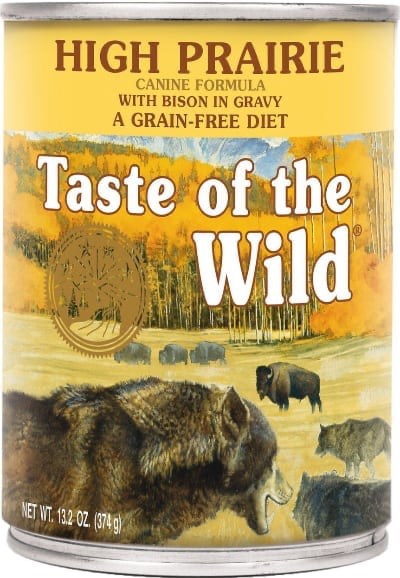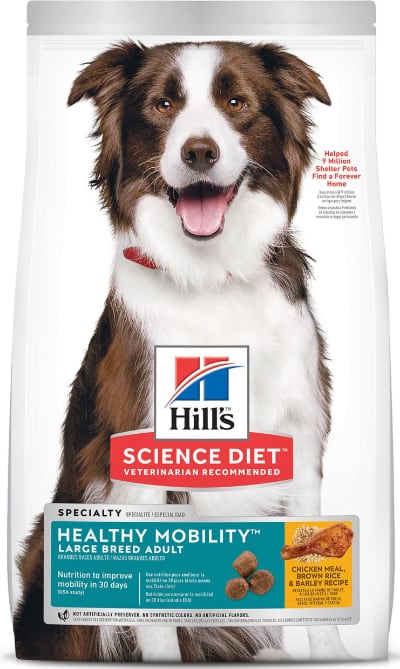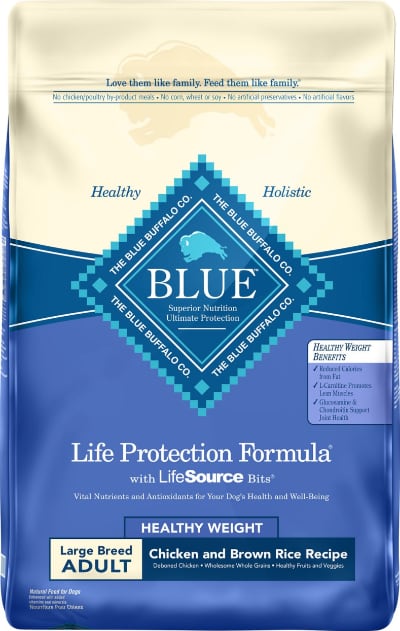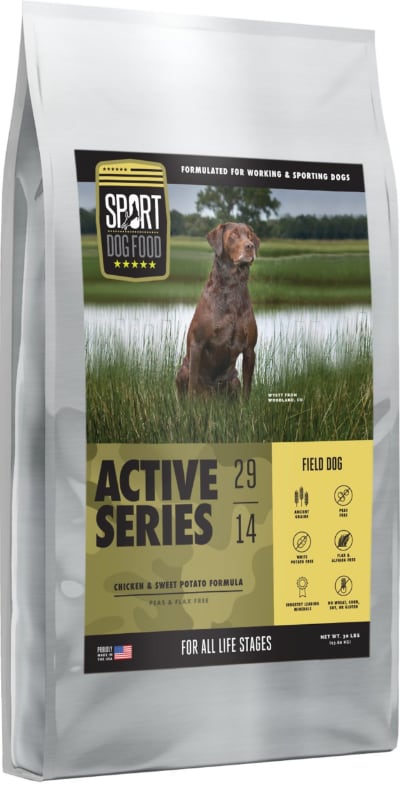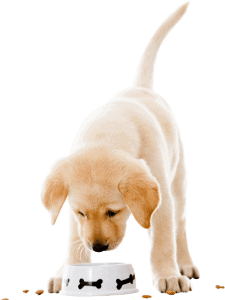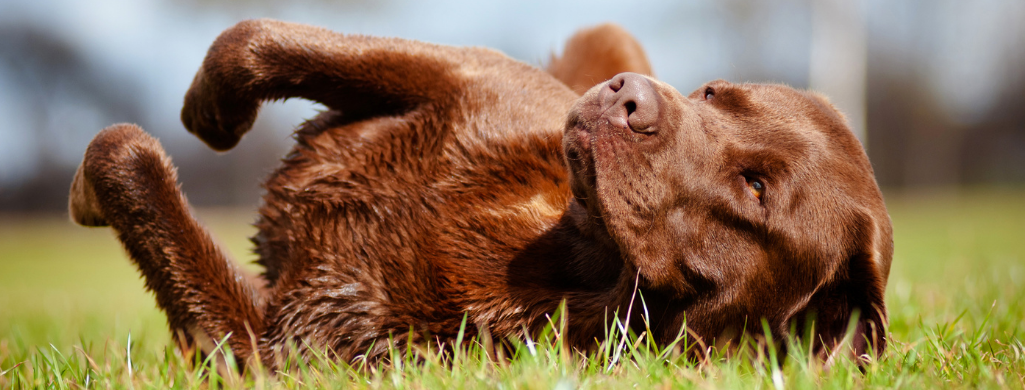
This is our review of the best dog food for Labs in 2024.
The best dog foods for this breed offer balanced nutrition in a low-calorie formula.
That “fluffy” Lab of yours may love his food. But a predisposition for obesity can have serious health consequences.
I’m a veterinary technician with a background in biology. And I researched the best dog foods for Labrador Retrievers to help you find the best food for your dog.
I found that Nutro Ultra Large Breed Adult Dry Food is the best overall dog food for Labs.
Your dog’s individual needs will vary. So, I’ve included reviews of the best brands for every category of dog food for Labradors.
Let’s get started.
Our Best Dog Food For Labs
- Nutro Ultra Large Breed Adult Dry Food (Best for Adult Labs)
- Royal Canin Labrador Retriever Puppy Food (Best for Lab Puppies)
- Wellness Complete Health Senior Food (Best for Senior Labs)
- Diamond Naturals Large Breed Adult Food (Best Budget Food for Labs)
- Wellness Core Large Breed Dog Food (Best Premium Food for Labs)
- Taste of the Wild High Prairie Wet Food (Best Wet Food for Labs)
- Canidae Pure Grain-Free Dog Food (Best Dog Food for Labs with Allergies)
- Hill’s Science Diet Healthy Mobility Large Breed Food (Best Dog Food for Joint Health)
- Blue Buffalo Life Protection Weight Control Food (Best Dog Food for Weight Control)
- Sport Dog Food Active Series Field Dog Food (Best Dog Food for Sporting Labs)
10 Best Dog Foods for Labs Reviewed
All dog foods included on this list meet the standard AAFCO nutrient profile guidelines for dogs. Always consult your veterinarian before making changes to your dog’s diet.
Nutro Ultra Large Breed Adult Dry Food
- First 5 Ingredients: Chicken, Chicken Meal, Whole Brown Rice, Rice Bran, Whole Grain Oatmeal
- Key Feature: Holistic formula combines premium lean proteins with superfoods
- Guaranteed Analysis: 22% Crude Protein, 13% Crude Fat, 4% Crude Fiber, 10% Moisture
- Caloric Content: 350kcal/cup
- Type of Product: No Corn, No Wheat, No Soy, Pea-Free
- Life Stage: Adult
- Best For: Overall
This formula features three lean sources of premium animal protein.
Chicken, lamb, and salmon provide 22% crude protein while keeping fat content below 13%. Lean protein sources are critical for healthy muscles in athletic dogs.
A total caloric content of 350 kcal/cup meets your Lab’s needs while limiting the risk of weight gain in furry friends prone to extra fluff.
Sunflower oil provides healthy fat in the form of linoleic acid. This type of fat encourages oil production to protect your Lab’s waterproof coat.
The addition of nutrient-dense ‘superfoods’ provides a high concentration of vitamins without excess calories. These ingredients include kale, coconut, and blueberries.
Naturally sourced glucosamine also helps manage joint diseases associated with Labs. Plus, this food does not include any harmful chemical additives.
Dog owners rave about improved vibrance and digestive function when feeding their Labs this formula.
This dog food is an excellent fit for the unique dietary needs of a Labrador Retriever. But the kibble is relatively small compared to other large breed brands.
Royal Canin Labrador Retriever Puppy Food
- First 5 Ingredients: Chicken-By-Product Meal, Brewers Rice, Brown Rice, Corn Gluten Meal, Wheat Gluten
- Key Feature: Breed-specific formula exclusively for Lab puppies
- Guaranteed Analysis: 31% Crude Protein, 12% Crude Fat, 3.6% Crude Fiber, 10% Moisture
- Caloric Content: 308 kcal/cup
- Type of Product: Breed-Specific
- Life Stage: Growth
- Best For: Lab Puppies
Labrador Retrievers are prone to developmental disorders when they grow too fast. So breed-specific nutrition is critical for proper development as puppies.
A high protein content of 31% from chicken ensures that young Labs have the appropriate building blocks for healthy muscle.
Additional macronutrients are appropriately balanced to provide energy for young athletic dogs. Brown rice provides an excellent source of digestible carbohydrates. But the moderate caloric content of 308 kcal/cup prevents Labs from growing too fast.
Balanced Calcium and Phosphorus ratios are also essential for healthy bone growth. This formula features an ideal balance of 0.85% calcium and 0.72% phosphorus.
High fiber helps support good intestinal bacteria in your puppy’s young digestive system. And antioxidants like vitamins E and C help boost natural defenses in young Labs.
Reviews share plenty of success stories detailing healthy puppies growing up on this formula. But the recipe does include several common allergens and may not be suitable for sensitive Labs.
Wellness Complete Health Senior Dog Food
- First 5 Ingredients: Deboned Chicken, Chicken Meal, Oatmeal, Ground Barley, Ground Brown Rice
- Key Feature: Whole-food formula designed to support large senior dogs
- Guaranteed Analysis: 22% Crude Protein, 10% Crude Fat, 4.25% Crude Fiber, 10% Moisture
- Caloric Content: 416 kcal/cup
- Type of Product: No Corn, No Wheat, No Soy, Weight Control
- Life Stage: Senior
- Best For: Senior Labs
When Labs age, their metabolism slows down even further. The breed has a predisposition to obesity at any age. But managing senior dogs’ weight is especially critical.
This formula uses concentrated nutrition to meet your Lab’s dietary needs. A 24% protein content comes from real chicken as the first ingredient.
Additional whole food ingredients are easily digestible. This allows for better nutrient absorption by senior dogs.
This filler-free dog food is suitable for seniors who suffer from food sensitivities. There are no wheat, corn, soy, by-products, or artificial preservatives in this recipe.
Added glucosamine and chondroitin help manage joint pain caused by common degenerative conditions.
And taurine supports heart health. This amino acid is essential for breeds prone to obesity as extra pounds can stress your dog’s cardiovascular system.
Dog owners appreciate the full support in a small portion size. But, some seniors Labs have an easier time eating this food after soaking the hard kibble.
Diamond Naturals Large Breed Adult Dry Dog Food
- First 5 Ingredients: Chicken, Chicken Meal, Whole Grain Brown Rice, Cracked Pearled Barley, Ground White Rice
- Key Feature: Affordable formula with high-quality ingredients
- Guaranteed Analysis: 23% Crude Protein, 13% Crude Fat, 3.5% Crude Fiber, 10% Moisture
- Caloric Content: 327 kcal/cup
- Type of Product: No Corn, No Wheat, No Soy,
- Life Stage: Adult
- Best For: Budget Lab Food
This budget formula features the same superfood ingredients of premium dog food. Nutrient-dense ingredients include kale, pumpkin, and chia seeds.
Real chicken provides an ideal source for this food’s 23% crude protein content. Comparable budget alternatives often rely on by-products as their primary ingredient.
A blend of fruits and vegetables provides a natural source of vitamins and antioxidants. Antioxidants help protect your dog’s tissue from damage by free radicals.
Every Diamond Naturals product includes 80 billion CFUs of a proprietary probiotic blend. Lactobacillus Acidophilus is a probiotic strain proven to improve digestive health in dogs.
Pumpkin and coconut also increase digestibility with soluble and insoluble fibers.
Lab owners who use this food notice improvements in their pup’s bowel movements.
I am a budget-conscious dog owner myself. And I appreciate that Diamond Naturals proves you don’t have to compromise quality for affordability.
Wellness Core Grain-Free Large Breed Dry Dog Food
- First 5 Ingredients: Deboned Chicken, Chicken Meal, Turkey Meal, Lentils, Peas
- Key Feature: Premium high-protein, grain-free formula
- Guaranteed Analysis: 34% Crude Protein, 12% Crude Fat, 6% Crude Fiber, 10% Moisture
- Caloric Content: 342 kcal/cup
- Type of Product: Grain-Free, No Corn, No Wheat, No Soy, High-Protein
- Life Stage: Adult
- Best For: Premium Lab Food
Your dog’s evolutionary diet is the foundation for this premium formula. The high 34% protein content of this food is ideal for athletic Labradors.
In some diets, higher protein means higher fat and calories. But chicken and turkey provide primary sources of animal protein with little fat.
Additional whole food ingredients provide natural sources of essential nutrients. Flaxseed is rich in Omega-3 fatty acids for coat health. And kale is a good source of calcium and vitamin K to support bone health in Labs.
This recipe also includes glucosamine to support joint health. Plus, the label is free from by-products, artificial additives, corn, wheat, and soy.
Owners prefer this dog food as a premium, grain-free option formulated for large dogs’ specific needs.
Some owners found that their pets did not like the taste of this more expensive dog food. But Labradors rarely turn their nose up at anything edible.
Taste of the Wild High Prairie Grain-Free Wet Food
- First 5 Ingredients: Beef, Lamb Broth, Beef Broth, Lamb Liver, Bison
- Key Feature: Tasty wet food for fussy eaters
- Guaranteed Analysis: 8% Crude Protein, 3.5% Crude Fat, 1% Crude Fiber, 82% Moisture
- Caloric Content: 322 kcal/cup
- Type of Product: Grain-Free, Chicken-Free
- Life Stage: Adult
- Best For: Wet Food for Labs
Real beef is the very first ingredient in this food. The mix also includes bison, lamb, and venison.
A protein content of 8% seems deceptively low compared to competitors due to high moisture content. But this food is also high in protein and even includes organ meat. Organs are excellent sources of nutrients such as vitamin A.
These protein-rich ingredients are essential for healthy muscles in athletic dogs. The grain-free formula is also ideal for sensitive pups since it does not include corn, wheat, or fillers.
Digestible carbohydrates from sweet potatoes provide energy. And real fruits like blueberries offer natural sources of vitamins and antioxidants.
Reviews from owners share that this food is the best choice for the fussiest eaters. Be sure to introduce dietary changes gradually as some dogs experience minor diarrhea when switching to wet food.
Canidae Pure Grain-Free Dog Food
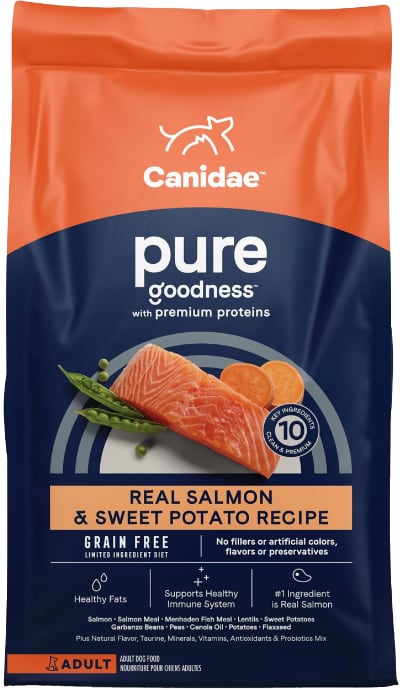
- First 5 Ingredients: Salmon, Salmon Meal, Menhaden Fish Meal, Sweet Potatoes, Peas
- Key Feature: Limited Ingredient diet based on Salmon and Sweet Potatoes
- Guaranteed Analysis: 32% Crude Protein, 18% Crude Fat, 4% Crude Fiber, 10% Moisture
- Caloric Content: 496 kcal/cup
- Type of Product: Sensitive Digestion, Grain-Free, Chicken-Free, No Corn, No Wheat, No Soy, Gluten Free, Limited Ingredient Diet
- Life Stage: Adult
- Best For: Labs with Allergies
This formula is a limited-ingredient diet designed for dogs who suffer from allergies or sensitive stomachs. Unfortunately, Labs have a predisposition for allergies.
Limited ingredient diets help manage allergic reactions by limiting allergen exposure. Salmon is the only source of animal protein in this 24% crude protein food.
Most allergens are protein. So a single protein source limits exposure and potential for developing new allergies.
This simple recipe uses only eight ingredients. Sweet potatoes offer the primary source of digestible carbohydrates in this grain-free formula. The recipe also eliminates common allergens such as grains, soy, wheat, and corn.
In addition to being an excellent source of protein, Salmon also contains high levels of healthy fats. These omega fatty acids are essential for coat health in labs and do not necessarily directly translate to weight gain.
This food may not be the best option for overweight Labradors due to the high caloric content. Still, many dog owners report successfully managing their Lab’s allergies with this diet.
Hill’s Science Diet Healthy Mobility Large Breed Food
- First 5 Ingredients: Chicken Meal, Brewers Rice, Whole Grain Sorghum, Brown Rice, Whole Grain Wheat
- Key Feature: Specialty diet to support joint health in large dogs
- Guaranteed Analysis: 28% Crude Protein, 12% Crude Fat, 3% Crude Fiber, 10% Moisture
- Caloric Content: 367 kcal/cup
- Type of Product: Mobility Diet
- Life Stage: Adult
- Best For: Labs with Joint Problems
This dog food features a 28% protein content from chicken meal. It is not grain-free and includes several whole grain sources of digestible carbohydrates.
A high concentration of Omega-3 fatty acids from fish oil helps reduce inflammation. This has a direct impact on easing discomfort caused by joint inflammation in Labs.
High levels of glucosamine and chondroitin provide the building blocks for healthy cartilage. These popular ingredients help manage joint pain by limiting cartilage breakdown.
Added vitamin E and C work together as powerful antioxidants. Antioxidants help protect joints from damage caused by free radicals.
This food has an excellent reputation as a mobility formula. Most owners report improvements in their dog’s comfort within the first 30 days of use.
However, the large kibble pieces may increase choking risks if your lab bolts his food.
Blue Buffalo Life Protection Weight Control Dog Food
- First 5 Ingredients: Deboned Chicken, Chicken Meal, Brown Rice, Barley, Peas
- Key Feature: Weight control formula for overweight dogs
- Guaranteed Analysis: 22% Crude Protein, 9% Crude Fat, 10% Crude Fiber, 10% Moisture
- Caloric Content: 323 kcal/cup
- Type of Product: Weight Control, No Corn, No Wheat, No Soy
- Life Stage: Adult
- Best For: Overweight Labs
Overweight Labs are vulnerable to severe health problems. Putting your pup on a diet that will help him return to a healthy weight is vital.
Lean animal proteins like real chicken promote healthy muscle development. This formula provides adequate amounts of protein at 22% while boasting a low 9% fat content.
A high 10% fiber content keeps your dog feeling full without providing too many calories. Fiber is also beneficial for digestive health.
Overweight dogs often struggle with joint and skeletal disease. The chelated minerals in this formula support strong bones in overweight dogs. And ingredients like glucosamine protect their strained joints.
L-Carnitine is the critical ingredient of this weight control formula. This essential amino acid helps build lean muscle. It also promotes fat burning and weight loss in overweight dogs.
Many dog owners find that this formula is useful for helping their overweight dogs achieve healthy weight loss. However, some dogs can experience slight digestive upset when switching to a higher fiber diet.
Sport Dog Food Active Series Field Dog Food
- First 5 Ingredients: Chicken Meal, Whole Ground Sorghum, Dried Sweet Potato, Turkey Meal. Whole Ground Millet
- Key Feature: High energy formula for sporting dogs
- Guaranteed Analysis: 29% Crude Protein, 14% Crude Fat, 3.5% Crude Fiber, 10% Moisture
- Caloric Content: 483 kcal/cup
- Type of Product: Flax-Free, No Corn, No Wheat, No Soy, Gluten Free, Pea-Free, Non-GMO
- Life Stage: Adult
- Best For: Sporting Labs
We bred Labs to live active lifestyles as sporting dogs. And many owners still take their Labs hunting today.
This formula features several lean animal proteins. A high protein content of 29% and moderate fat content of 14% is ideal for providing sporting Labs with adequate energy.
One cup of this food contains 483 calories. Digestible carbohydrates from whole grain ingredients also provide energy for sporting activities.
A healthy amount of taurine supports cardiovascular health in hard-working dogs. And high levels of omega-3 fatty acids from salmon oil help maximize muscle recovery.
Dog owners appreciate the flax free formula for dogs who suffer from allergies.
Pet parents who feed this dog food also report success keeping a healthy weight on active dogs. But, it may not be suitable for the family couch potato.
Guide to Buying Dog Food For Labs

Any Lab owner will attest that their pet will happily eat just about anything they offer them. So it’s up to you to select the best diet for your Labrador.
Nutritional Requirements
All Labradors need a balanced diet that contains the correct ratios of protein, fat, and carbohydrates.
Quigh Quality Protein
Omnivores like dogs need significant sources of protein from lean meats every day. Athletic dogs like Labradors should eat a diet with moderate to high protein levels.
Choose a formula that contains at least 22% crude protein. Crude percentages use scientific tests to calculate the amount of protein provided by food.
Growing puppies will need higher levels of protein to support muscle development. And sporting Labs will need adequate protein for muscle recovery.
Lower Fat
Labs have a love for food that can easily result in the accumulation of a few extra pounds. I can relate.
The best dog foods for Labradors will have lower fat content to avoid excess calories. Look for formulas with crude fat percentages of 18% or less.
Healthy fats promote oil production to maintain your Labrador’s water-resistant coat. Choose a dog food with quality sources of omega fatty acids, such as fish oil.
Digestible Carbohydrates
Large dogs like Labs do not necessarily need high levels of carbohydrates included in their daily diet. Unlike toy breeds, they can effectively store carbohydrates as glycogen.
Moderate levels of digestible carbohydrates will provide your Lab with adequate energy. Avoid formulas that use refined sources of carbohydrates that can promote excess weight gain.
Whole grains are the best source of this macronutrient. Grain-free formulas also provide nutritious sources of complex carbohydrates like sweet potatoes.
Vitamins and Minerals
Any dog food you consider for your pup should meet AAFCO’s nutrient profile guidelines for dogs. A balanced ratio of minerals and vitamins will help your Lab develop properly throughout his life.
Chondroitin and Glucosamine
Large breeds often have a genetic predisposition for developing joint problems. Obesity problems experienced by these dogs can also place excess strain on their joints.
Chondroitin and Glucosamine are building blocks of joint cartilage. Healthy cartilage is critical for lubricating joints and preventing discomfort.
You can find these ingredients in many dog food formulas designed for large dogs. They are especially crucial for older Labradors who may suffer from degenerative conditions.
DHA and Taurine
DHA is a type of omega-3 fatty acid. These healthy fatty acids play a vital role in coat health and brain function. They also help reduce inflammation associated with joint conditions.
Labradors need sources of healthy fatty acids in their diets to support oil production by their skin. This oil production is necessary to protect their unique water-resistant coats.
Taurine is an amino acid that plays a vital role in heart health. Taurine can lower the risks of heart failure by reducing cholesterol and blood pressure. This support is especially crucial for overweight labs at risk of heart problems.
Calcium and Phosphorous
Calcium and phosphorus are essential minerals that play a vital role in the formation of bones. Inadequate levels of these minerals in your dog’s diet can weaken his skeletal system.
Mineral deficiencies in growing Labs can cause chronic skeletal disease and improper development. Always ensure your Lab’s food contains adequate levels of these minerals.
Probiotics
Some dog food formulas include probiotic blends to help boost digestibility. Probiotics introduce good bacteria into your dog’s digestive tract.
These bacteria help break down food and enhance nutrient absorption. This allows Labs to use their food efficiently without eating excess calories.
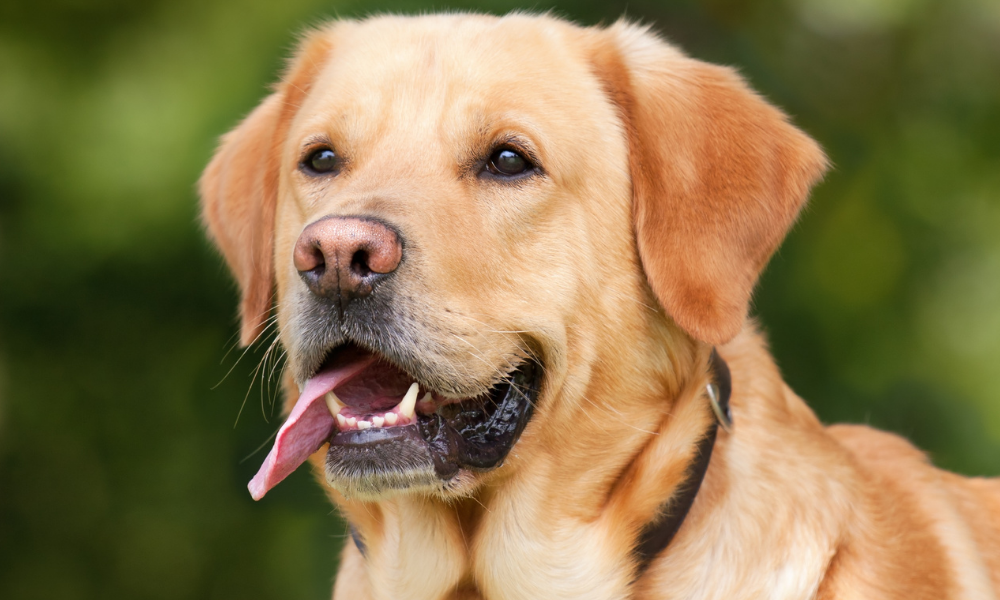
How to Choose Dog Food for Labs
Once you have determined that a dog food meets your Lab’s basic needs, select a formula that best meets the individual needs of your furry best friend.
Calories
Sporting Labs need concentrated calories to provide them with adequate energy for hunting. But most family Labradors have low to moderate caloric needs. Your pup can quickly gain weight if he overeats.
The average dog needs a daily diet of around 30 calories per pound of body weight.
How Much to Feed Labradors
Individual requirements will vary between Labs depending on age, activity level, and existing health conditions. Young Labs require more protein than older Labs, while active dogs need more calories than the average family couch potato.
I met sporting Labrador retrievers in veterinary practice who could eat twice as much as less active dogs. If you fed a hunting Lab’s diet to a family’s pet, their beloved Labrador would soon start to resemble a hippopotamus.
| Life Stage | Weight | Meal Size | Meals Per Day |
|---|---|---|---|
| Puppy | 15-18 Pounds | 2 Ounces | 4 |
| Puppy | 24-26 Pounds | 3-3.5 Ounces | 3 |
| Puppy | 50-60 Pounds | 6-8 Ounces | 2 |
| Adult | 61-80 Pounds | 1.75-2.25 Cups | 2 |
| Adult | 80+ Pounds | 2.25-2.75 Cups | 2 |
Always consult your veterinarian when designing a diet for your dog.
Digestibility
Fiber content is another crucial aspect of a Labrador’s diet. Dogs do not use dietary fiber as their primary energy source, so high fiber content will not contribute to weight gain.
But, fibers are vital for healthy digestion. Beet pulp and other healthy sources of fiber act as prebiotics to enhance nutrient absorption from food. A healthy gut and proper absorption are crucial for efficient food utilization.

Health Issues and Diet
Common health problems that affect Labradors can have a direct connection to their diet. Here are some common ailments that proper nutrition can help manage.
Bone and Joint Problems
Large breeds frequently suffer from arthritis because their size places excess strain on their joints. Extra pounds can also contribute to the development of degenerative joint diseases.
Feeding a proper diet can help prevent obesity in Labradors. A healthy weight is vital for healthy joints. Labs are predisposed to weight gain and should eat low to moderate calorie diets.
Labradors are also predisposed to hip and elbow dysplasia. This skeletal disorder results in a malformation of the joints and leads to severe arthritis. Rapid growth caused by excessive feeding as a puppy can increase the risks of this disease.
Look for chondroprotective ingredients like glucosamine when shopping for dog food for Labs with joint concerns. Adequate levels of calcium and phosphorus also play a vital role in bone and joint health.
Obesity
Many of the Labradors that I met in vet clinics were overweight. Labs love food, and sometimes it’s hard to say no to that cute furry face.
But, the preferred eating habits of Labradors mean these lovable pups pack on the pounds quickly. Reducing the calories in your dog’s diet will help him maintain a healthy weight. This can limit the risks of common health ailments associated with obesity, such as diabetes.
Bloat
Labradors are deep-chested dogs who can develop bloat. This condition is a potentially fatal problem that owners should take seriously.
The condition occurs when your dog’s stomach expands and twists, causing an obstruction. The expansion of the stomach can compress surrounding organs. And a twisted gut can compromise the blood supply of the entire body.
Dogs who bolt their food are at increased risk of developing this problem. Feeding your Lab in a slow feeder and splitting his food into multiple meals per day can help prevent this serious issue.
Heart Problems
Labradors have a higher risk of suffering from congenital heart disease than other breeds. While genetic disorders result from a defect present at birth, diet can also play a role.
Overweight dogs are also at risk of developing acquired heart diseases, just like people. Managing your Lab’s weight is essential for promoting heart health. But there are also several other factors to keep in mind.
Heart failure is associated with the retention of salt. So your veterinarian may recommend a low sodium diet for your dog. And the addition of Omega-3 fatty acids can help stabilize heart muscle cells.
Taurine is another essential nutrient that plays a vital role in heart health. This amino acid helps lower cholesterol and blood pressure, reducing the risk of heart failure.
Eye Problems
Senior Labradors often develop cataracts as they age. Cataracts make your dog’s lenses opaque instead of clear. This prevents light from reaching the retina and ultimately can cause blindness.
Diabetes in overweight Labs can increase the risk of cataract development.
Retinal dysplasia is another eye problem that affects Labrador Retrievers. This condition involves abnormal development of the retina.
Feeding a diet rich in antioxidants like vitamin E can help promote healthy eyes by protecting tissue from damage.
Our Verdict
Managing your Labrador’s weight is critical when selecting the right dog food.
The best dog food options for Labs are high protein, low-calorie formulas.
Balanced foods like Nutro Ultra Large Breed Adult Dry Food will help you minimize common health problems.
Labs may love all food.
But not all food loves them.
Help your Lab reach his full potential by working with your veterinarian to select the best dog food. And read more about how much to feed your dog.
FAQ
How do you manage a Labrador Retriever’s weight?
Proper diet and exercise are critical for canine weight management. This breed has a predisposition for obesity. But feeding a diet low in calories and fat can help keep the pounds off. You can read more about how to help your dog lose weight here.
How often should you feed a Labrador Retriever?
Labs are prone to bloat, which can occur when dogs overeat too quickly. Be sure to divide your pup’s food into two or more meals per day.

